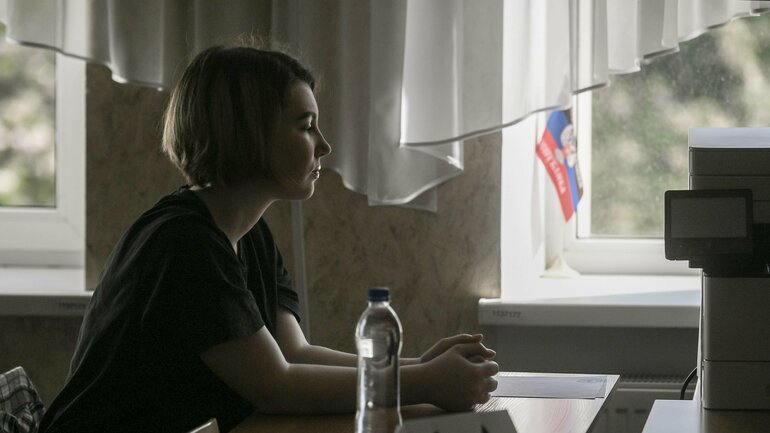Russia’s Programme of Educational Indoctrination in Ukraine’s Occupied Territories

On 24 February, Russia began what it called a special military operation in Ukraine. Russian president Vladimir Putin’s justification for this war included the return of so-called historic land that had allegedly been stolen from Russia. Since the invasion, the Russian state has constructed a comprehensive and overt educational programme with the goal of indoctrinating young Ukrainians in the occupied territories, specifically those in the Donbas, with the notion that Russia and Ukraine are one and the same.
Youth groups are often targeted for propaganda purposes because the places in which they are educated tend to be spheres with favourable power dynamics, such as teacher-student relationships. Given its focus on potential leaders of the future, Russia’s campaign could have an immense cost, and any change or reversal of the policy could take years.
The decimation of Ukraine’s cultural landscape
For several months, media outlets have exposed to the world the atrocities committed by Russia in Ukraine, including massacres, sexual violence, and the general destruction of Ukraine’s physical landscape. News websites have shown Ukrainian people fortifying their cities. Anti-tank hedgehogs have been deployed in the streets as a way of slowing Russian advances, while protective wrapping has sheltered important monuments and artefacts from bombing campaigns.
Yet, Russia’s invasion continues to threaten these major sites of collective memory and identity. The war ‘destroys [Ukraine’s] cultural heritage. Bombs destroy museums, libraries, churches and mosques, universities and theatres’, noted a BBC report in May. Several important cultural spaces have already been destroyed, including the Babyn Yar Holocaust memorial in Kyiv, an ironic target for a military operation whose supposed goal is to defeat Nazism.
Indeed, this destruction emphasises monuments’ physical fragility at the hands of military power, and their targeting is used as a way of demoralising society. However, in the face of physical destruction, there is a strengthening of Ukrainian identity beyond cultural artefacts: videos have circulated on social media showing people in underground shelters singing Ukrainian songs. Meanwhile, groups like Saving Ukrainian Cultural Heritage Online are working to preserve and archive significant documents.
Erasing Ukraine from Russia’s education
Very early on in Russia’s war, the state ordered the removal of Ukrainian references from educational materials. Provoshchenie, a popular textbook publishing group, told media outlet Mediazona that it had been ordered to limit references to Ukraine and Kyiv in its textbooks. Educational textbooks are avenues of perceived uncontested knowledge and provide a window onto the world for students. As official sources of information, usually written by specialist scholars, they are seen to ‘represent the truth of historic events’. Ukraine’s limited exposure in Russian textbooks will have a lasting effect, as it is likely to ensure that the Russian people do not see Ukraine as its own legitimate country with a culture and statehood separate from Russia’s. This is, of course, an intended aim of the Russian state, which wants to reinforce the idea that Russia and Ukraine are one and the same.
On 11 March, at a meeting of the chairmen of the Russian Historical Society (RIO), Sergei Naryshkin, Director of the Foreign Intelligence Service and Chairman of the Russian Historical Society, noted, ‘Today I would like to discuss with you the question of how to best use the resources of RIO members in solving the problems facing the country. Our immediate plans include, for example, the development of a historical and educational module for refugee children from the Donetsk and Luhansk People’s Republics.’ His statement was accompanied by calls to teach these children about the ‘shared historical milestones’ between Russia and Ukraine. In April, RIO established branches in Donetsk and Luhansk. According to Russian state media outlet TASS, ‘Naryshkin stressed that this primarily means the inclusion of the [Donbas] republics in a common, unified historical and cultural space’.
This cultural unification is taking place through formal historical education. In April, Russia’s Ministry of Science and Education reported that Russian history textbooks had been sent to universities in Luhansk and Donetsk. Several refresher courses for Donbas university history teachers followed. An article by RIO reported that these teachers had learned about the ‘origins of the formation of the old Russian state, the unification of Russian lands around Moscow, and the formation of the territory of the Russian state in the 16th and 17th centuries’. In June, the historical museum of the Southern Federal University hosted an award ceremony, giving certificates to these teachers for their participation. The process continues.
Education as a forum for change
On the Russian social media site VKontakte, the president of the Academy of Education, Olga Vasilyeva, noted, ‘We need quality training in history. History forms a citizen’s attitude towards society, guarantees continuity of generations, and forms a citizen’s personality and perception of ideas and world values.’ For a long time, education has been used as a forum for enacting societal change and shaping identity. Russia’s concentration on education shows that it is hugely important for the state not only to physically colonise Ukraine but also to enter the minds of its citizens – and that Russia considers historical education a convincing forum for such change to take place.
Dr Allyson Edwards is a teaching fellow at the University of Warwick and an expert in use of memory, patriotic education systems, and historical myth making.